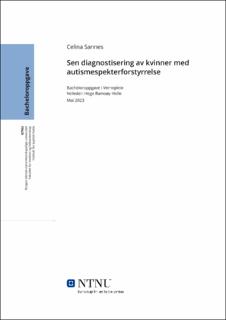| dc.contributor.advisor | Ramsøy-Halle, Hege | |
| dc.contributor.author | Sannes, Celina | |
| dc.date.accessioned | 2023-07-18T17:21:58Z | |
| dc.date.available | 2023-07-18T17:21:58Z | |
| dc.date.issued | 2023 | |
| dc.identifier | no.ntnu:inspera:143262155:64614216 | |
| dc.identifier.uri | https://hdl.handle.net/11250/3080085 | |
| dc.description.abstract | Tittel: Sen diagnostisering av kvinner med autismespekterforstyrrelse
Introduksjon/bakgrunn: Mange kvinner med høytfungerende autismespekterforstyrrelse (ASF) får ofte diagnosen sent i livet, og det finnes ulike årsaker til dette fenomenet. En av grunnene er at kvinner har en tendens til å kamuflere sine symptomer, enten bevisst eller ubevisst, noe som fører til at deres tilstand blir uoppdaget. Å bli diagnostisert med ASF i sen alder kan få alvorlige konsekvenser for kvinners psykiske helse.
Hensikt: Hensikten med oppgaven er identifisere både årsakene og konsekvensene sen diagnostisering kan ha for kvinner med autismespekterforstyrrelse.
Metode: Denne bacheloroppgaven benytter seg av metoden litteraturstudie. Fem fagfellevurderte forskningsartikler samt annen relevant litteratur er brukt for å besvare oppgavens problemstilling.
Resultat: Basert på analysen av forskningsartiklene ble resultatene delt inn i fire hovedtema: 1. Sen diagnostisering, 2. Kamuflering/maskering, 3. Psykisk helse, og 4. Seksuelle overgrep.
Konklusjon: Årsakene til sen diagnostisering viser seg å være komplekse. Deltakerne i studiene rapporterte lignende erfaringer med manglende kunnskap om ASF hos jenter og kvinner blant fagpersoner, feildiagnostisering, kamuflering av symptomer og diagnosekriter er basert på gutter og menn. Å motta sen ASF-diagnose hadde betydelige negative konsekvenser for deltakernes psykiske helse, men høy forekomst av stress, angst, depresjon og tilfeller av seksuelle overgrep. Deltakerne påpekte at noen av konsekvensene kunne vært unngått dersom de hadde fått diagnosen tidligere.
Nøkkelord: Autismespekterforstyrrelse, sen diagnostisering, psykisk helse, komorbide lidelser, kamuflering/maskering.
Antall ord: 6561 | |
| dc.description.abstract | Title: Late diagnosis of women with autism spectrum disorder
Introduction/background: Most women with high-functioning autism often receive their diagnosis at å late age. There are various reasons for this phenomenon. Among them, women tend to camouflage their symptoms both consciously and unconsciously, which can lead them going unnoticed. Receiving a late autism spectrum diagnosis can have serious consequences for women´s mental health.
Purpose: The purpose of this study is to identify both the causes and consequences of late diagnosis of women with autism spectrum disorder.
Method: The method used in this study is literature studies, where five research papers, as well as other relevant literature have been analysed and used to address the study.
Results: Based on the analysis of the articles, the results were divided into four main themes: 1. Late diagnosis, 2. Camouflaging/masking, 3. Mental health, and 4. Sexual abuse.
Conclusion: The causes of late diagnosis appear to be complex. The study participants shared similar experiences of healthcare professionals and teachers lacing sufficient knowledge about autism spectrum disorder in girls and women, misdiagnosis, camouflaging of symptoms, and diagnostic criteria being based on the experiences of boys and men. Receiving a late diagnosis had significant negative consequences for the participants mental health. It was reported high prevalence of stress, anxiety, depression, as well as sexual abuse. The participants highlighted that some of the consequences could have been avoided if they had received the diagnosis earlier.
Keywords: Autism spectrum disorder, late diagnosis, mental health, comorbid difficulties, camouflaging/masking.
Number of words: 6561 | |
| dc.language | nob | |
| dc.publisher | NTNU | |
| dc.title | Sen diagnostisering av kvinner med autismespekterforstyrrelse | |
| dc.type | Bachelor thesis | |
